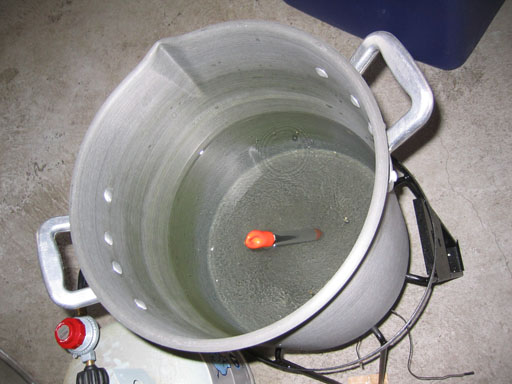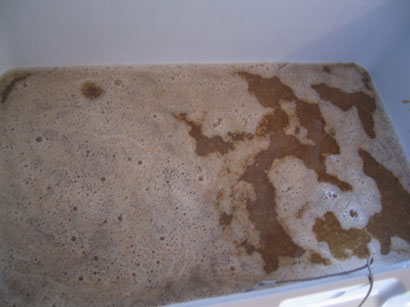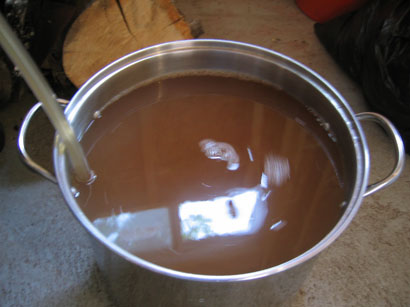
First All-Grain batch, June 25, 2005
Belgian Saison, Northern Brewer recipe
[Go HERE for my Guide to Simple All-Grain Brewing, created January 2006]

After I got a free wort chiller from a friend, I bought a turkey fryer. The only thing that was left was to build a cheap and easy mash tun, and I was on my way to doing an all-grain batch. Above is the strike water for my Belgian Saison.

I started with 3 gallons of 165 degree water (1.1 qts water/lb grain). I knew that would not be enough to hit my mash temp and was planning on adding more. After adding 10.75 lbs grain, my temp was 149. I added 3 quarts of 188 degree water, and hit my temp right on.

Here is my temp after adding 15 quarts of water. At that point my water/lb grain ratio was 1.4 qts/lb. I was generally shooting for somewhere between 1.25 and 1.5, so I was happy with that.

I realized I would have to cut a small notch out of my cooler in order to be able to leave my thermometer cable in the mash the entire time. I notched it where you can see the cable, but also had to take a small part out of the lid in order to be able to close it.

After 37 minutes I noticed my temp was down to 149. Because I had not quite maxed out my water/grain ratio, I heated up some water quick. I added 1 quart of boiling water, but my temperature remained the same (149 deg) after stirring. At that point my water/grain ratio was 1.49 qts/lb and I did not want to add any more water. I had 18 minutes left in my one-hour mash so I just let it be.
Is the lower temp responsible for perhaps not quite getting quite as much out of the grain as I might have?

Before I collected my first runnings, I started heating the sparge water. I estimated I could collect 3 gallons from the mash, so I started heating 3.5 gallons of water to 190 degrees.

The Vorlauf from the first runnings. It seemed to clear almost immediately but I probably took out about 1.5 quarts.

The grain bed after the first runnings were mostly collected.

I ended up only collecting about 2.5 gallons (out of 4 gallons that had gone in to the mash). This means that my absorption rate and/or the amount left in the bottom of the cooler was slightly higher than I expected. I hoped to get closer to 3 gallons.

So I had 2.5 gallons already and I was hoping for 6 total. I put in 3.5 gallons of 190 degree water back into the mash tun for the batch sparge. I stirred it well and hit a temperature of 168 degrees, just what I was shooting for. I let that sit for 10 minutes before Vorlaufing again and sparging.

Collecting the second runnings. I was thinking I would get about 3.5 gallons because that was my sparge water amount. I got just about that. Above is a 4 gallon pot.

I know that just above the rivets is 6 gallons. I had to add 1quart of water to get to that amount.

My little brew setup in the garage.

There are a lot of Kent Goldings hops in this recipe. Two oz bittering, 1 oz at 10 min, and 1 oz at flame out.

I had been going at it for nearly 3 hours by the time the boil was well underway and I thought it was a great chance to call upon one of my favorite mottos: "It's Noon somewhere..."

I filled the laundry sink with cold water, dumped some ice in, and put frozen 1/2 gallon jugs of water in the corners. I collected the run off water in the laundry tub. I've used this method 4 times and it always gets the beer down to 80 degrees in 15 min or less. From what I hear that is a pretty typical amount of time to get to that temp.

So how much did I end up with in the end? Just under 5 gallons. After I added my yeast starter I was right at 5 gallons. I usually will go up to around 5.25 or so, but for this batch I decided not to top it off with just water. Next time I can start with a little more in my brew kettle to make sure I end up with enough.
From heating the first strike water to cleaning up the last pot, the whole thing took about 5 hours. I had always heard that it took 6 hours so the batch sparge method is a little faster than the fly sparge method.
I was shooting for 1.056 which assumes a 70% efficiency. I ended up at 1.052. Using Promash or the tool on TexanBrew I figure I had 66-67% efficiency. I had heard that one can get a bit higher than that with the batch sparge method, but I certainly was close to my target gravity. I'm not sure yet if I just need to adjust recipes for my efficiency, or if I can get a little better extraction rate next time.
Any comments on how I might get better efficiency with this system and this method? Or is this pretty typical for this setup?
At any rate, the beer was fermenting a couple hours later and so a Belgian Saison is born. It's my first Saison, and my first all grain batch. Hopefully it will turn out well.